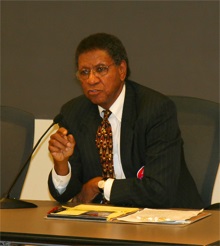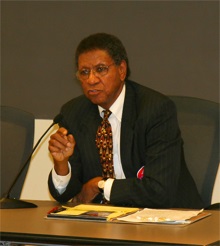

Timothy Lionel Jenkins was born on December 30, 1938 in Philadelphia, Pennsylvania. Jenkins studied political science and philosophy at Howard University and went on to graduate from Yale Law School. After graduating from Yale Law School in 1964, Jenkins went about as far away from civil rights as a lawyer could.
In those days, Pennsylvania attorneys were required to do an apprenticeship, and his was at the Philadelphia firm of Norris, Green, Brown and Higginbotham. A former lawyer at the firm had joined the pharmaceutical company Smith, Kline and French Laboratories (now part of GlaxoSmithKline) and offered Jenkins a job. Newly wed and a father, Jenkins was looking for a steady income, so going to Smith Kline was a no-brainer. But it also affected his view of lawyers.
“It became clear to me that lawyers were not the movers and shakers I thought they were,” Jenkins says. “Lawyers are, typically, brought in at the tail end to clean up the details after major decisions have already been made. It really diminished my enthusiasm.”
Jenkins soon found himself gravitating back toward civil rights. Jenkins had played a key role in shaping SNCC’s movement into organizing for voting rights. When the sit-ins began in 1960, he was the student body president at Howard University.
During the summer of 1960, Jenkins, who was also the vice president of the National Student Association (NSA), was able to secure funding from the New World Foundation to hold a three-week student leadership seminar in Nashville beginning on July 30, 1961. “We made a calculated attempt to pull the best people out of the movement,” Jenkins commented, “and give them a solid academic approach to understanding the movement.”
Tim Jenkins was the person, who in investigating Mississippi legal codes, discovered the statute that allowed residents to cast protest votes. This was the genesis of the Freedom Vote and led to SNCC and COFO’s efforts to run Aaron Henry as candidate for Mississippi governor. Jenkins later played an important role in lobbying for the Voting Rights Act of 1965.
But it was the Freedom Schools that Jenkins considered SNCC’s crowning achievement. They taught young Blacks that they could have a future. The impact that those schools had on their local communities was the important legacy of SNCC.
Reflecting on his days with Norris Green, he realized that law could still be used as an instrument for shaping policy.
“Most of their practice was not focused on trying cases,” he says. “Instead, it was more about helping institutional clients and shaping their policies.” Jenkins took that model and used it to provide legal representation to organizations that had sprouted up in the civil rights era, including co-ops, housing and teachers’ groups and other professional organizations.
“When I graduated from Yale, I was coming out at a time when the Black Power movement was unfolding,” Jenkins says. “The black community was articulating its needs to have our own laborers, businesses, accountants, teachers unions and so on. I also did a lot of work in the South for farmers who wanted to create their own land development enterprises.”
Jenkins also helped found the National Conference of Black Lawyers in 1968. The organization’s initial clients included the likes of Angela Davis, Assata Shakur, members of the Black Panthers and several inmates from the Attica prison riots. He says that, between his own cases and the ones he worked on for the NCBL, there were times when he’d have as many as 300 cases going at once.
“Many of the clients I represented were cause-oriented, not just commercial or civic organizations but activist organizations,” Jenkins says. “I was never completely free of the activist orientation.”
Source: ABA Journal
